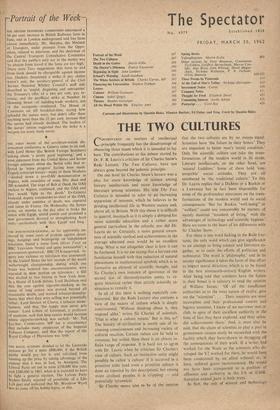—Portrait of the Week— 'HIE BRITISH TRANSPORT COMMISSION announced a
10 per cent. increase in British Railways fares in June, and in London underground and bus fares almost immediately. Mr. Marples, the Minister of Transport, under pressure from the Oppo- sition, refused to intervene, and the chairman of the Central Transport Consultative Committee said that the public's only say in the matter was 'to abstain from travel if the fares are too high.' There were Tory suggestions that fares to and from work should be chargeable against income tax. Dockers threatened a strike if pay claims weren't met; the secretary-general of the Civil Service National Whitley Council's staff side described as 'stupid, disgusting and outrageous' the Treasury's offer of a two per cent. pay in- crease; and the unofficial strike at Number 10 Downing Street-Lot' building-trade workers, not of the occupants--continued. The House of Commons sat till breakfast-time, saying how splendid the nurses were, but didn't offer them anything more than the 2f per cent, increase that the nurses had already declined. The leaders of the nurses' unions suggested that the strike is a weapon for every trade union.
THE FIRST PHASE of the seventeen-nation dis- armamcnt conference at Geneva came to an end, with Lord Home (the British Foreign Secretary) talking about 'a pretty good beginning, and a joint statement from the United States and Soviet foreign ministers about the Berlin talks that re- ferred t,o 'some progress' having been made. French conscript troops—many of them Moslems '-'-mowed down a pro-OAS demonstration in Algiers, with casualties of some fifty dead and 200 wounded. The siege of Bab el Oued, the OAS enclave in Algiers, continued, and the OAS said they would 'fight to the death.' Ex-General Jouhaud, deputy commander-in-chief of the OAS, already under sentence of death, was captured and taken to France. On Wednesday the Syrian army, six months to the day after it broke the union with Egypt, seized power and promised a new government devoted to strengthening Arab unity—particularly with 'dear Egypt' and Iraq.
THE POSTMASTER-GENERAL, so far apparently un- moved by some years of protests against shoot- ings, hangings and beatings-up on independent television, found a scene from Oliver Twist on BBC Television 'brutal and quite inexcusable'; a government-sponsored, BBC-ITA-supported, in- quiry into violence on television was announced. In the United States the last seconds of the world welterweight championship, during which one boxer was battered into unconsciousness, were repeated in slow motion on television : a Bill was drafted to ban boxing in New York State. In a House of Lords debate, Lord Hailsham said that the case against cigarette-smoking as the cause of lung cancer was proved beyond all reasonable doubt, and warned tobacco-manufac- turers that what they were selling was potentially lethal : Lord Sinclair of Cleeve, a tobacco manu- facturer, said that 'the happy man never gets cancer.' Lord Cohen of Liverpool, a professor of medicine, said that lung cancer would increase unless cigarette-smoking was curbeil: 'Mr. Ted, Leather, Conservative MP for a constituency that includes many employees of the Imperial Tobacco Company, said that the report of the Royal College of Physicians was 'tosh.'
•
THE ROYAL ACADEMY decided to let the Leonardo cartoon go for a mere £800,000, if the British public would pay for it, and refrained from running up the price by taking advantage of the rumour that it was, in fact, by Annigoni. The Liberal Party set out to raise £150,000 this year, and £200,000 in 1963, when it is expected to have to fight a general election. The Labour Party leaders finally rejected all possibility of a Lib- Lab pact and indicated that Mr. Woodrow Wyatt was to come off his hobby-hgrse, or else.














































 Previous page
Previous page